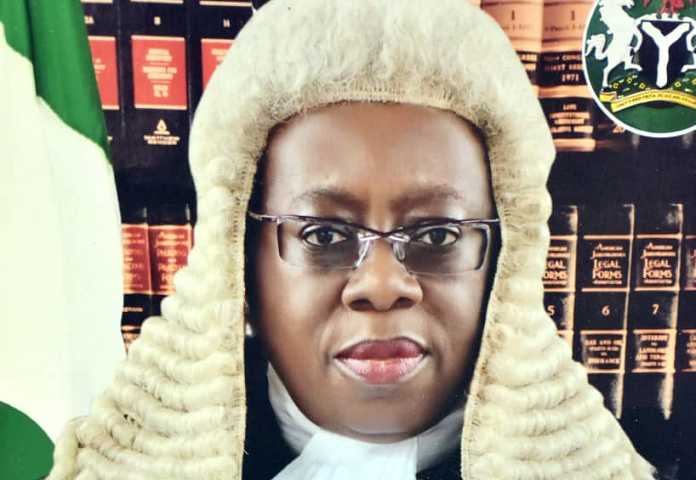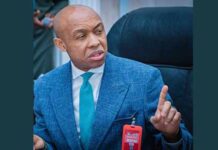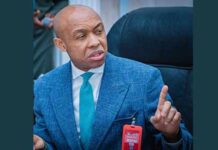In this report, Ise-Oluwa Ige examines the latest crisis that erupted in Rivers State arising from two conflicting judgments by two high court judges on the conduct of local council election in the state together with the perspectives of lawyers on the trending practice of serving judges struggling for jurisdiction in sensitive political cases.
Apparently worried by the fresh crisis that erupted in Rivers State in the last few days arising from conflicting orders by two high court judges of coordinate jurisdiction on whether or not local council election in the state should hold on October 5, 2024, top lawyers in the country are piling pressure on the National Judicial Council, NJC, to urgently wade into the case even in the absence of petitions and scapegoat any judicial officer found wanting in the matter.

Some of the stakeholders pushing the position are a respected member of the inner bar and former member of Imo State House of Assembly, Chief Mike Ahamba, SAN, one-time Abia State Attorney General and Commissioner for Justice, Prof Awa Kalu, SAN, a renowned academic, Prof Chidi Anselm Odinkalu and a respected silk, Chief Samuel Jibrin Okutepa, SAN, among others.
The lawyers who described as embarrassing the current practice by serving judges in the country to struggle for jurisdiction in political cases said until examples are made, the integrity of the judiciary will continually wane while the nation’s fledgling democracy would be at risk.
NJC, a creation of section 153 of the 1999 Constitution, is presently headed by the new Chief Justice of Nigeria, Justice Kudirat Kekere-Ekun.
Vanguard recalls that sometimes in May, this year, under the watch of the immediate past Chief Justice Olukayode Ariwoola, three judges of coordinate jurisdiction —Justice Mohammed Liman, Justice S. Amobeda and Justice Amina Aliyu, in quick succession, similarly granted conflicting orders in Kano emirship dispute, which not only heated up the polity and scandalized the judiciary but also left the Kano emirate with two substantive emirs till date.
Both Justices Mohammed Liman and Justice S. Amobeda are serving under the Federal high court bench while Justice Amina Aliyu is of the Kano state judiciary.
Although Chief Justice Ariwoola invited the heads of the Federal high court and the Kano state high court to his Abuja office to get first-hand information on the circumstances surrounding the issuance of the embarrassing conflicting orders, Vanguard reports that none of the three judges handed off the cases until judgment while none was sanctioned.
But upon her assumption of office, the new CJN said it would not be business as usual.
However, few days after her elevation, two judges—Justice Peter Lifu of the Federal high court, Abuja and Justice Chigozie Igwe of the Rivers State High Court, Port-Harcourt, issued conflicting orders regarding local council elections that recently held in Rivers state.
The conflicting orders have since set the state on fire.
Although impeccable sources at the NJC said the Council is already intervening in the matter, the effect of such intervention is yet to be seen.
Genesis of the latest crisis
Vanguard reports that a full panel of the Supreme Court had, on July 11, 2024, declared as unconstitutional the practice of state governors holding funds allocated for local government administrations.
In the lead decision of the apex bench delivered by Justice Emmanuel Agim, the court held that the 774 local government councils in the country should manage their funds themselves, adding that “anything other than this will be taken as a gross misconduct.”
After the judgment, the Federal Government gave state governors 90 days to comply with the order or be denied funds meant for the running of their local councils.
Following the development, all state governments that did not have democratically elected local council government in place began to take steps to conduct election.
While Rivers State was making its own efforts, the All Progressive Congress filed a lawsuit marked FHC/ABJ/CS/987/2024 to stop the local council elections scheduled for October 5, 2024 in the state until the Rivers State Independent Electoral Commission, RSIEC, met the necessary conditions to conduct the local government elections.
During the pendency of the case at the Abuja Federal high court, another political party—Action Peoples Party (APP), had approached a Rivers State high court in Port Harcourt with a lawsuit marked PHC/2696/CS/2024 for an order compelling Rivers State Government, its governor and the state Independent Electoral Commission to willy-nilly conduct the local council election on October 5, 2024.
The state high court presided over by Justice I.P. Chigozie Igwe in a judgment ordered the state government to hold the local council election on October 5, 2024 even as it directed the Independent National Electoral Commission to release the voters register to the state’s electoral commission for the conduct of the poll.
But on September 30, a Federal High Court in Abuja barred the Nigeria Police Force and other security agencies from providing security during the Local Government Election while it also stopped the National Independent Electoral Commission from releasing the voters register to the state’s electoral commission until certain conditions were met.
The judgment of Justice Peter Lifu was in conflict with the judgment entered by a judge of the Rivers state high court.
Specifically, given the conflicting judgments, the Legal Department of the Nigeria Police Force advised the police to obey the ruling from the Federal High Court on September 30, 2024, on the account that it takes precedence over that of the Rivers state high court which was the first in time.
The conflicting court judgments gave the two opposing parties in the state to pick and choose depending on what favoured them.
Specifically, Governor Fubara, at a press conference in Government House, Port Harcourt, insisted that the local government council election would hold as scheduled notwithstanding the fact that the police vowed not to provide security during the election.
Fubara had accused the Inspector General of Police (IGP) and the entire Nigeria Police Force of serving the interest of an Abuja-based politician to scuttle the LG elections.
Although the election held amidst violence, the state has been on fire with stakeholders blaming the Federal high court of giving order that conflicted with the provisions of the 1999 Constitution.
Judgments that defile logic, justice flying around —Okutepa, SAN
Following the shenanigans, a firebrand advocate, Mr Samuel Jibrin Okutepa, SAN who did not mention any particular case had wondered aloud why impeccable elder statesmen of the bar were keeping mum in the face of waning integrity of the legal profession.
“In those days when members of the legal profession were the hope of the marginalised and oppressed, there were strong and impeccable elder statesmen of the legal profession. When any member within the legal profession exhibited conduct that had potential of lowering the integrity of the legal profession, these elders waded in and ensured that the integrity of the legal profession did not suffer jeopardy in the hands of bad legal practitioners and judges
“Do we still have elders of Spartan courage and mien in the profession? I am asking because the legal profession is in need of elders who can save the profession from coming to a calamitous end. Today, judgments that defiled logic and justice are flying here and there. There are strong perceptions of state capture of our justice systems. Politics has entered the legal profession. Where are our elders? This is not the best time for the legal profession,” he added.
Court orders these days are so ‘lucrative’—Prof Odinkalu
Also reacting, a former Chairman of the National Human Rights Commission, Prof Chidi Anselm Odinkalu, said that the joke now is that “court orders these days are so lucrative that many judges make them – in good old Nigeria-speak – double-double. Responsibility for this sorry state lies mostly with the Federal High Court.
“The ancient city of Kano now has two Emirs, one state and the other federal after a rogue Federal High Court judge decided to take chieftaincy into the federal realm. Edo State has two Deputy Governors too.
“By dint of the judicial labours of Peter Lifu, a judge, the Federal High Court also attempted to impose two separate dates on Rivers State for the conduct of Local Government elections after Chigozi Igwe, a judge of the High Court of Rivers State, had issued a considered decision setting 5 October as the date for the election.
“Rivers State Governor, Sim Fubara, acknowledged Peter Lifu’s hardwork by handing him the moniker of “that justice that gave that fraudulent judgment.”
“This is not the first time the Federal High Court will gratuitously constitute itself into an appellate forum to review without benefit of the records of proceedings and with the practised ill-will of a political hit-job dressed up in judicial robes, decisions of State High Courts.
“Nor is it the first time that the Federal High Court will convert itself into a court of unlimited jurisdiction that it is not at the expense of a State High Court which, under the Constitution, is indeed the only court of unlimited jurisdiction. This Federal High Court has become the place where the law falls into disrepute and Lady Justice suffers repeat rape,” he added.
Why should a judge order police not to provide security—NBA
The Nigerian Bar Association (NBA) which has also lamented the menace of conflicting judgments from the affected high court judges concerning the scheduled elections stated that even if a court has directed the Police not to work with the Electoral Commission on Rivers State, nothing says the Police should not provide security for peace and order of Rivers State, adding that the refusal to provide security was not only unconstitutional but also illegal, immoral, and a dangerous signal that invites lawlessness and undermines democracy.
NJC should wade in even without petition, scapegoat erring judicial—Ahamba, SAN
A respected member of the inner bar, Chief Mike Ahamba, SAN has also expressed revulsion at the abhorred practice of judges granting conflicting orders to heat up the polity and scandalize the judiciary.
“Those who are supporting the Federal high court in this affair should let us know under what section of the constitution a Federal high court has jurisdiction on matters outside the purview of section 251 of the constitution,” adding that the Federal high court in the first place ought not to hear such matter.
He said the National Judicial Council should not wait for petition when this kind of thing happens, advising that they should make reference to the law, call the errant judge to order and punish him.
He added that until one or two judicial officers are retired, others would not sit up.
Awa Kalu, SAN
Also contributing, Prof Awa Kalu, SAN said that a Federal high court has no jurisdiction to entertain cases on local government and its affairs just as he wondered why a high court judge would order police not to perform its constitutional duty.
“A Federal high court, a state high court and a National Industrial Court are equal under the Constitution. What we expect as law abiding citizens is that no court should place itself beyond another when you are on the same level.
“When you have local government election, why should it be controlled by federal high court? And again, the primary duty of the police is to maintain law and order. So, why should a court direct police not to do what they are supposed to do—maintenance of law and order,” he queried rhetorically.
Vanguard










